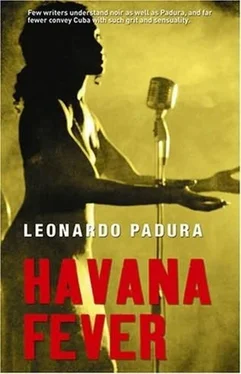Leonardo Padura - Havana Fever
Здесь есть возможность читать онлайн «Leonardo Padura - Havana Fever» весь текст электронной книги совершенно бесплатно (целиком полную версию без сокращений). В некоторых случаях можно слушать аудио, скачать через торрент в формате fb2 и присутствует краткое содержание. Жанр: Триллер, на английском языке. Описание произведения, (предисловие) а так же отзывы посетителей доступны на портале библиотеки ЛибКат.
- Название:Havana Fever
- Автор:
- Жанр:
- Год:неизвестен
- ISBN:нет данных
- Рейтинг книги:3 / 5. Голосов: 1
-
Избранное:Добавить в избранное
- Отзывы:
-
Ваша оценка:
- 60
- 1
- 2
- 3
- 4
- 5
Havana Fever: краткое содержание, описание и аннотация
Предлагаем к чтению аннотацию, описание, краткое содержание или предисловие (зависит от того, что написал сам автор книги «Havana Fever»). Если вы не нашли необходимую информацию о книге — напишите в комментариях, мы постараемся отыскать её.
Havana Fever — читать онлайн бесплатно полную книгу (весь текст) целиком
Ниже представлен текст книги, разбитый по страницам. Система сохранения места последней прочитанной страницы, позволяет с удобством читать онлайн бесплатно книгу «Havana Fever», без необходимости каждый раз заново искать на чём Вы остановились. Поставьте закладку, и сможете в любой момент перейти на страницу, на которой закончили чтение.
Интервал:
Закладка:
Conde and Yoyi had dropped by Carlos’s place with pizzas they’d bought en route and two bottles of rum to clear their throats and brains. While Josefina improved the so-called pizzas by adding a few slices of onion, tomato purée and slivers of green pepper requested by her son, the Count delved into the cupboard on the terrace to unearth the record player, fearing all the while it would be unable to produce a single note. After dusting it inside and out, he cleaned the needle with a handkerchief soaked in a high octane, recently purchased rum, and finally connected it to the current, to see if the turntable at least spun round.
The first bottle uncorked was already on its third round when Conde started to lower the arm and put the needle in place, to allow the gravel-throated speaker to emit a few preliminary crackles. Then, like big drops of rain heralding the heavy downpours of summer, the almost violent chords of a piano, and only a piano, reached their ears, with no excessive flourishes or trills, quickly joined by the beat of a bongo, the deep sound of the double bass and, finally, a voice that spoke rather than sang, imbued with an almost male heaviness, first pleading, and then with an aggrieved, demanding resentment, making you feel you didn’t need to see the woman to know there was something different about her rich, husky voice, intent on speaking to the inner ear rather than singing:
You who fill everything with joy and youth
and see ghosts in the night’s half light
and hear the perfumed song from the blue.
Be gone from me…
Don’t stop and look at
the dead leaves on the rose
that fade and never flower,
look at the landscape of love
that is the reason to
dream… and love…
I’ve fought against all evil,
my hands, broken by clinging tight,
no longer cling to you.
Be gone from me…
In your life I’ll be the best
from the mists of yesterday
when you’ve forgotten me,
like the best poem’s always
the one we can’t remember…
So now… be gone from me.
When the Count opened his eyes and silently lifted the needle from the virgin area of the acetate, he was absolutely confident that two days ago, when he’d been surprised by a hunch as he crossed the threshold of the library of the mighty Montes de Ocas, that it wasn’t impelling him to discover a fabulous book, as he’d believed, but was marking out a path so he could confront that voice sleeping in his past, a voice that waited only for him. Could that be right? Not thinking or looking at the equally silent and moved Skinny or Pigeon, the Count put the arm back over the first groove on the record and let himself be transported by the melody and voice, like a lover overcoming the delights from a first touch, and embarking on a quest for the more recondite essences behind that punchy vocal. He tried to grasp the drama suggested by a voice directed at a you who might be anyone: him, or possibly his own father, perhaps bewitched by the same woman, voicing a feeling that was too much like true suffering and that, at the end of the first stanza, adopted a pleading tone when it asked: “Be gone from me”. But then the voice ordered: “Don’t stop and look”, recalling distant echoes of the Bible, that made their full impact in the third stanza where the voice became slower, wearier, even more whispering, telling of its refusal to go on with that struggle to the death. The final act erupted with a fresh refrain where the voice anticipated a possible, if undesired, future, when its owner would vanish into the dense mists of yesterday. And concluded on an order that brooked no appeal, a last, heartbreaking “Be gone from me”, intent on silencing the music that only returned, as the voice’s last vibrations faded, hot and heavy, into a predicable total silence… but, a brief interlude opened before it reiterated its final wish beyond all appeal: “so, now… be gone from me”, a visceral demand that convinced the Count her way of singing was involved in much more than a game of mirrors with reality: wasn’t it in fact pure, genuine reality?
“What the fuck is all this about?” he asked, now out loud, and placed the pick-up arm on its stand, while the silent acetate continued to spin hypnotically. He raised his half empty glass and gulped down the rum trying to restore his composure. He slowly felt reunited with his anatomy and the place that had been blurred by emotions aroused by the music.
“You reckon that woman disappeared?” asked Skinny Carlos, his arms and hands exhausted by so much clinging, and now trying as best he could to sit comfortably in his wheel chair.
“Apparently… She never sang again,” the Count confirmed. “I don’t even know whether she’s alive or dead…”
“I tell you, her voice is…” Yoyi sought in vain for an elusive adjective to capture that strange miracle.
“No one else sings like her, that’s for sure,” Skinny concluded, pouring round what was left in the bottle. “Put the other side on, savage.”
“No,” the Count rasped unthinkingly as he tapped the acetate. “No. Let me digest this first.”
Conde reread the credits on the record, spotlighted by the glinting gem that was the recording company’s logo, and finally put it back in the home-made grey-paper envelope Rafael Giró had made for it. He wondered whether now might be the moment to tell his friends he was sure his father had been in love with that singer, though he’d probably never spoken to her. But he decided it wasn’t up to him to make such a confession and blurted out, almost unthinkingly, a desire that was burning inside him:
“Fuck me. I’ve got to find out who she was and what happened to her.”
Mario Conde was now able to recall the twelve years he’d worked as a policeman without being attacked by an abrasive mixture of nostalgia and remorse. Reaping the benefits of the distancing process had been gradual, sometimes painful, like being cured of an addiction. The passage of time had exorcized the spell and removed the ballast his inevitably sordid police duties had lodged in the crevices of his soul. Relentlessly nostalgic or, as Skinny Carlos defined him, a bastard who was always remembering, he took a double pleasure from this distancing that finally allowed him to view his time spent as a police investigator as blurred and lethargic. Consequently, when circumstances forced him to recall his days as the representative of the forces of order he’d been for twelve years, he felt alienated from himself, like a stranger who’d lived too long among the supposedly strong and powerful, when he was naturally inclined to membership of the club for non-conformists.
Nonetheless, knowing he was too attached to his memory, Mario Conde was forced to recognize that the destruction of that fragment of his existence had simply been a survival strategy he’d clung to when deciding to give a new – or was it old? – meaning to his life. Perhaps what most helped exorcize the past, in that process of denial, was his belief that he’d never been unfair and, above all, the certainty he’d never acted arrogantly, unlike so many past and future colleagues. His allergic reaction to violence or the use of force, his rejection of the police’s propensity to assault conscience and dignity, always spared him the usual excesses of his trade and, at the same time, other harmful secondary effects such as the corruption that blotted the copybooks of several colleagues, and destroyed many of the Count’s illusions, enabling him to grasp more clearly than ever the all-conquering frailties of the human soul – even of souls who claimed they had the power and responsibility of justice on their side.
Читать дальшеИнтервал:
Закладка:
Похожие книги на «Havana Fever»
Представляем Вашему вниманию похожие книги на «Havana Fever» списком для выбора. Мы отобрали схожую по названию и смыслу литературу в надежде предоставить читателям больше вариантов отыскать новые, интересные, ещё непрочитанные произведения.
Обсуждение, отзывы о книге «Havana Fever» и просто собственные мнения читателей. Оставьте ваши комментарии, напишите, что Вы думаете о произведении, его смысле или главных героях. Укажите что конкретно понравилось, а что нет, и почему Вы так считаете.











